Lutes and Ukes
Southampton’s Head of Early Music Liz Kenny tells us about her summer project: In my daily life I play the lute. I’m interested in how groups of plucked instruments organized themselves to produce music on the stage and in shows and masques in the seventeenth century, and how we might go about it now. I’m also a card-carrying fan of the Ukulele Orchestra of Great Britain, and it suddenly occurred to me that this was a road they’d been down, with great musical results that also had a sense of challenge and fun. Curious to know their rehearsal methods and thoughts on this and that, I got in touch and the conversation started.
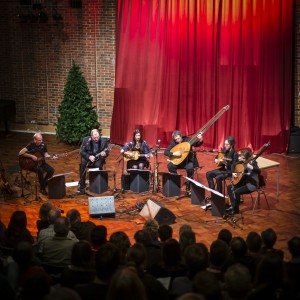
Photo: Gerry Walden
We hung our early-music-meets-the-blues collaboration on the coincidence of names between a sixteenth-century church musician, Shakespeare’s lute player and the delta Blues legend: all called Robert Johnson (check out the Lutes and Ukes Facebook page for clips, photos and more). Musically they turned out to have more than we expected in common, too. We test-drove the concept in Turner Sims a few months before taking it to Spitalfields Music and the York Early Music Festival, recruiting a large group of Southampton first year students as a focus group: they told us frankly where to up our game (throw away the music, take more risks…) before joining us in some improvisation.
We got together again in early summer. Coffee breaks would find people in corners discussing the similarities between a renaissance guitar and a tiny uke, or musing on why theorboes (large lutes) are so long, difficult to carry and expensive, when a baritone uke does the trick at a fraction of the time and hassle…and why one musician learns things from recording stuff into a phone, and another writes crib notes in lute tablature…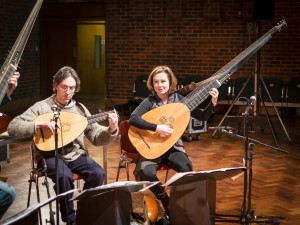
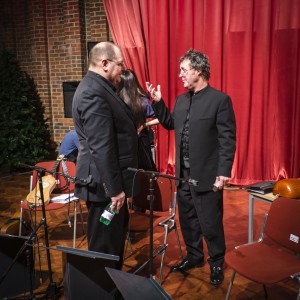
I liked what the Guardian said:
It’s not often you witness a player attacking their instrument with a bottleneck while another strokes theirs with a quill. Yet it was more than just a gimmick, the correspondence between the two Johnsons proved to be instructive: both created sublime musical expressions of melancholy.
The York Post went for a more prophetic tone:
The York Early Music Festival will never be the same again.
As I’m one of their artistic advisors until 2014, I’m hoping this is a good thing, but you never know…
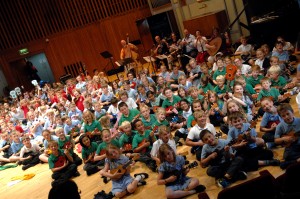
Meanwhile one of the other things I do at Southampton is run a course for Masters students on performance teaching, so I’m always mulling over how to get kids enjoying music. Having done song-based projects in Southampton, where a group of students and I would go regularly into schools (our part in the Orchestra of the Age of Enlightenment’s Anthem for a Child Project being the latest), I was wondering if there was a way to do it on instruments. The ukulele is a great solution: it sounds good with little experience but has a lifetime of possibilities in it, and 30 of them can be bought for relatively little money. All we needed was a project title and some schools: the ever-ready inspiration of George Hinchliffe gave us Youths Lutes and Ukes, and 360 children from 11 schools in Lewisham and York signed up for a term of ukulele-early-blues. You can go a long way with C, F and G chords….many hours later, here we are (see picture/s). Three players can tune 30 ukes in about 5 minutes, 60 in 10, and 180 is best done outside in the sunshine.
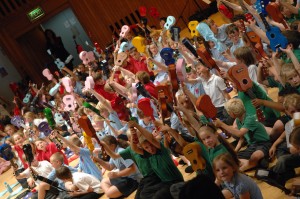
As well as our university, the National Centre for Early Music, Music4U, the SHM Foundation and the Lewisham and East Riding Music Hubs all supported Youths, Lutes and Ukes. Thank you!
